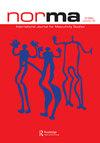‘I want to own myself:’ digital bordering, migrant masculinities, and the politics of refusal
IF 1.5
Q2 SOCIOLOGY
引用次数: 2
Abstract
ABSTRACT Over a period of eight years, in order to apply for asylum on mainland Greece most applicants had to first pre-register by calling the Greek Asylum Service on Skype. Due to issues of capacity and political will, the Skype calls were most frequently ignored, and applicants often continued calling without response every week for months to years in the hopes of receiving international protection, documentation, and social benefits. This paper explores the experiences of a handful of men who called on Skype with no response and decided to exit the system. In particular, it theorizes these exits as political acts of refusal that generate new possibilities of masculine self. Building upon doctoral fieldwork conducted in Athens, Greece, the paper discusses the challenges posed to masculinity by a technologized border regime that forced individuals to face digitalized alienation and erasure, considering the strategies that men employed to contest the system and safeguard their masculinities. The article contributes to refugee studies, critical studies of men and masculinities, and studies of digital bordering.“我想拥有我自己:”数字边界、移民男子气概和拒绝政治
本文章由计算机程序翻译,如有差异,请以英文原文为准。
求助全文
约1分钟内获得全文
求助全文
来源期刊

NORMA
Social Sciences-Gender Studies
CiteScore
3.00
自引率
14.30%
发文量
23
期刊介绍:
NORMA is an international journal for high quality research concerning masculinity in its many forms. This is an interdisciplinary journal concerning questions about the body, about social and textual practices, and about men and masculinities in social structures. We aim to advance theory and methods in this field. We hope to present new themes for critical studies of men and masculinities, and develop new approaches to ''intersections'' with race, sexuality, class and coloniality. We are eager to have conversations about the role of men and boys, and the place of masculinities, in achieving gender equality and social equality. The journal was begun in the Nordic region; we now strongly invite scholarly work from all parts of the world, as well as research about transnational relations and spaces. All submitted manuscripts are subject to initial appraisal by the Editors, and, if found suitable for further consideration, to peer review by independent, anonymous expert referees. All peer review is double blind and submission is online via Editorial Manager.
 求助内容:
求助内容: 应助结果提醒方式:
应助结果提醒方式:


